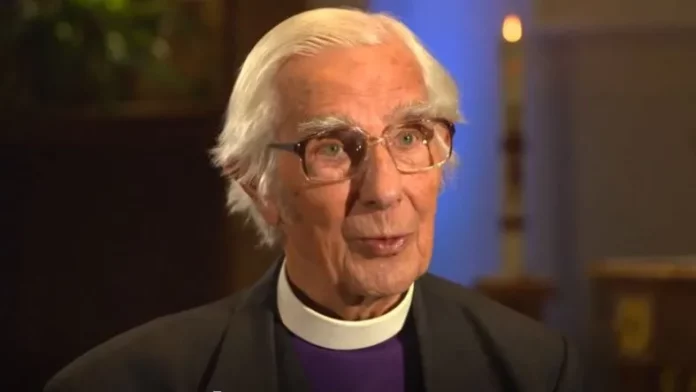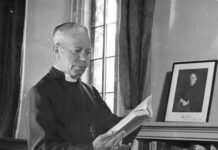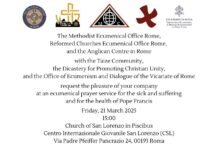A SERVICE of Thanksgiving for the life of Bishop Timothy Dudley-Smith will be held on Friday 27 September in St Andrew the Great Church, Cambridge, at 2pm (GMT+1). The service is open to all who knew Bishop Timothy personally, or through his hymns or writing.
The Dudley-Smith family also extends a wide invitation to friends around the world to join the service through a livestream, or to share in it later. Details of the livestream will be posted on www.timothydudley-smith.com
Timothy Dudley-Smith, former Bishop of Thetford, and a prominent evangelical, has been described as the leader of the ‘hymn explosion’ in the latter decades of the 20th century. He wrote in excess of 450 hymns including ‘Tell out, my soul’, ‘Name of all majesty’ and ‘Lord, for the years’. His hymns have appeared in hundreds of collections. He will also be remembered as John Stott’s authorized biographer, and the author of some 30 books. [A full biographical briefing is below in Editor’s Notes.]
The service will be conducted by the Revd Alasdair Paine and the preacher will be the Revd Giles Walter.
Timothy Dudley-Smith read Maths at Pembroke College, Cambridge before training for the ministry at Ridley Hall. After a curacy in Erith, Kent, he led the Cambridge University Mission (now The Salmon Youth Centre), a youth outreach in Bermondsey, east London. The boys loved him, and many went with him to hear the evangelist Billy Graham at his 1954 Crusade at Harringay, which drew capacity crowds nightly for three months. Its mark on the nation led to the founding in 1955 of a new magazine, Crusade, with Timothy Dudley-Smith, still in his twenties, as co-editor. From here Timothy was appointed to the Church Pastoral Aid Society (CPAS), where contemporaries on staff included two other highly gifted young men, Dick Lucas and Michael Baughen.
In 1966, by then CPAS Secretary (CEO), Dudley-Smith took a daring decision to publish Youth Praise, a song book drawn together by Michael Baughen and Richard Bewes, which had been turned down by other publishers. He saw a clear need for a young people’s hymnbook. It captured the moment and was launched at Westminster Central Hall with Cliff Richard participating.
For wider context: Also published in 1966 was Good News for Modern Man, the New Testament section of what became the Good News Bible. These two initiatives, unconnected, would bring massive change. The later 1960s saw the start of a spiritual awakening in schools and among students. By 1973 Youth Praise, with its sequel, had sold over a million copies, and Psalm Praise was launched. Under Tom Houston’s dynamic drive at the Bible Society, the Good News Bible would go on to gain an eighty percent share of all Bible sales. These decades in which Timothy Dudley-Smith played key roles, will merit doctoral study in years to come, exploring the separate and integrated influence of CPAS, the Bible Society, Scripture Union and the Inter-Varsity Fellowship (now UCCF) with Billy Graham’s visits and John Stott’s multi-dimensional ministry behind so much.
In 1973 Dudley-Smith was appointed Archdeacon of Norwich under Bishop Maurice Wood, and eight years later, in 1981, Suffragan Bishop of Thetford. Bishop Timothy was known for his care and concern for some hundred clergy who were often shouldering responsibility for ancient buildings as well as for their congregations. From 1975-81 he was a member of the Church of England General Synod, elected to its committee of chairmen in 1978.
On retirement Timothy Dudley-Smith embarked on writing the seminal two-volume biography of John Stott (John Stott, IVP 1999, 2001), widely acclaimed as scholarly and readable. He served into retirement as President of the Church of England Evangelical Council (CEEC); of the Evangelical Alliance; and of Latimer House Trust; and he chaired the governors at Monkton Combe School. He was a moving spirit behind the John Newton Project. In 1992 he accepted an appointment as lifetime honorary Vice-President for UCCF, and often spoke of how his own days in the Christian Union at Cambridge had given him a solid foundation. Always a fresh thinker, and having completed 30 books of his own, he worked with William Llewellyn on One Big Family, a collection of songs for families and children.
His honours included an OBE ‘for services to hymnody’; a Lambeth M Litt; an honorary doctorate from Durham University; and honorary Fellowships of hymn societies both sides of the Atlantic. While he had moved in privileged circles, and preached to royalty, he had no airs about his manner; he was always modest in his demeanour, preferring understatement.
Timothy Dudley-Smith’s final book, A Functional Art (OUP, 2017) published when he was 90, reflects on hymn-writing from his personal perspective and experience. He studied the poetic form of writers like Tennyson, Housman and de la Mare; and the hymnody of earlier masters, especially Wesley and Watts. He was a careful writer, theologically well-informed, and would reach for words with exactitude, revising and then revisiting his texts. When aspiring writers sent their work for comment, he often had to point out that composition required hard and dogged work, and they had ‘stopped work too soon’. Metre mattered as part of the poetic discipline, and not least for sing-ability; the flow needed to be lucid, syntax not contorted, rhymes following a pattern. It is no wonder that ‘Tell out, my soul’, ‘Name of all Majesty’ and ‘Lord, for the years’ remain among the nation’s favourites. His hymns and his writing, for which he will be best remembered, bear the mark of a leader, a pastor and an encourager.



